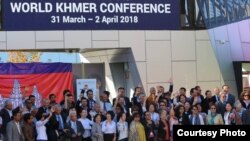Cambodian expatriates gathered in Australia last month have called for sanctions on the Hun Sen regime and a boycott of the upcoming general election if the opposition cannot participate.
Hong Lim, an organizer of the World Khmer Conference, held in Melbourne, Australia, said the meeting was called to bring attention to the deteriorating political situation in Cambodia.
Lim, who is a member of the Victorian Legislative Assembly, said: “We have to let the world know and pay attention to this issue. We want the international community to take the same position as they did for ten years during Vietnam’s occupation of Cambodia which installed Hun Sen to power.”
“We call for tough economic sanctions as they did to the Burmese junta until they agreed to let Aung San Suu Kyi take part in the government,” said Lim.
The World Khmer Conference participants also demanded the immediate and unconditional release of Kem Sokha, the former opposition leader, and other political prisoners, and called for free and fair elections.
The Cambodian government has intensified persecution of the opposition, civil society and independent media for nearly a year. The Supreme Court dissolved the opposition Cambodia National Rescue Party in November last year after arresting Sokha on charges of conspiring with foreign countries to topple the government. The actions of the Cambodian government have been strongly condemned by the international community.
Cambodians came out in high numbers to the polls in the 2013 national elections and the 2017 commune council elections, which saw the opposition grow stronger as the main challenger to the ruling Cambodian People's Party.
Australia’s former foreign minister Gareth Evans, who was involved in the Paris Peace Agreement to end the conflict in Cambodia 26 years ago, told the audience that he admired the "courage" and "resilience" of the Cambodian people, and it was important that politicians keep their hopes up.
However, Evans did not believe the forthcoming election was going to be free and fair.
“It will be a sham election,” Evans told reporters later. “We have to acknowledge that. How could it not be when the major [opposition] political party has been banned, the CNRP?”
Mu Sochua, vice president of the CNRP, who attended the conference, agreed that the presence of the former opposition party was necessary, but did not specify the party's stance on calls for boycotting the election.
"In principle, we understand that more than 3 million people voted for a peaceful change, so without a CNRP presence, we see that the election is not free and fair,” Sochua told VOA Khmer.
Cambodia is scheduled to hold national elections on July 29. Observers say that without the CNRP, the ruling CPP will easily win the election and extend Hun Sen's rule to almost 40 years.
“We believe that it’s people’s freedom to go to vote or refuse ... to vote,” said Suos Yara, CPP spokesman. “It’s democracy. But urging people not to go to vote is like pulling democracy backward.”




